Trusted by Thousands of Students Each Year
Get Access to UNLIMITED Exam-Style Practice Questions
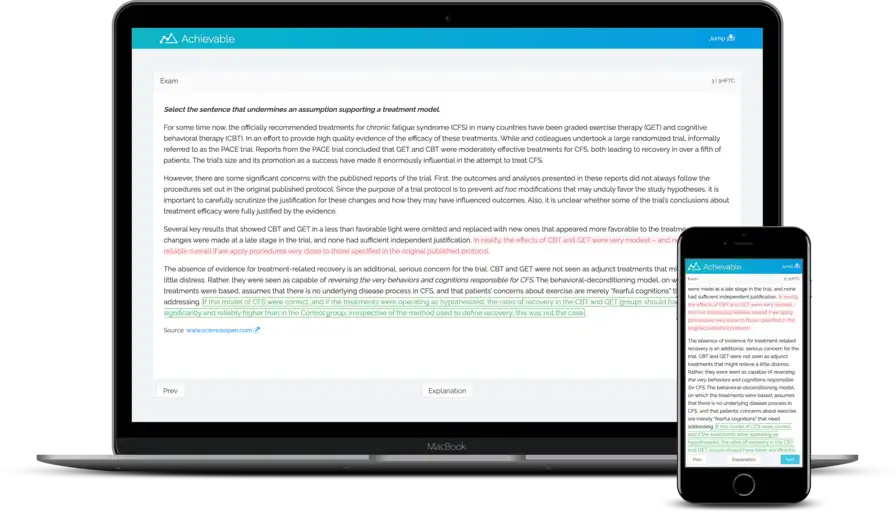
What Makes Our Question Bank Unique For GRE Study?
Preparation for the GRE requires a deeper approach than just reviewing material. While the convenience of GRE quantitative flashcards is known, the need for continual practice with diverse exam questions is paramount. Our platform provides an opportunity to engage with an infinite number of GRE quantitative exam questions.
While many GRE exam prep resources have a limited set of practice questions, our system stands out. It’s capable of producing millions of unique quizzes, utilizing over 200 GRE quantitative question templates. This process ensures that users are comprehensively grasping core concepts rather than merely remembering set answers. Furthermore, upon answering each question, users have the advantage of accessing a detailed breakdown explaining the mathematical and logical rationale behind the solutions.
Deep Dive into Verbal Reasoning
Verbal reasoning, an integral component of the GRE, is thoroughly addressed on our platform. With a collection of 200 meticulously crafted GRE verbal reasoning questions, users can simulate 10 complete verbal reasoning exams. Our practice questions encompass all varieties you might encounter during the actual exam, including reading comprehension, text completion, and sentence equivalence.
Revamp Your Vocabulary
Vocabulary plays a pivotal role in the GRE. Our platform expedites the vocabulary-building process with quiz-like drills for 250 of the GRE’s most frequently tested words. These quizzes mirror the exam’s style, prompting users to discern between various word sets, thereby amplifying vocabulary retention in a time-efficient manner.
Instantaneous Essay Feedback
One of the unique features we’re proud to present is our instant GRE essay grading system. Powered by advanced artificial intelligence and machine learning, this system immediately evaluates your GRE analytical writing essays. With a vast array of essay prompts available for both the GRE issue and argument essays, students can gain invaluable feedback in real-time.
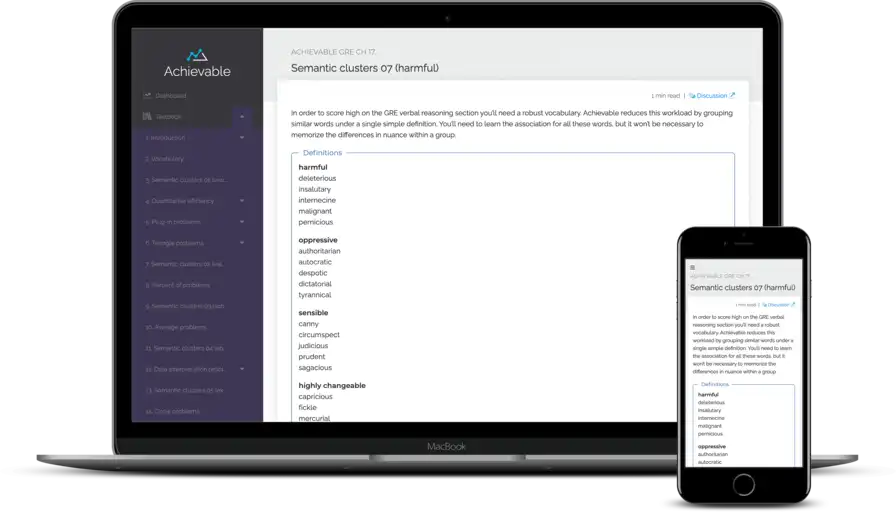
Advanced Personalized Learning
In the realm of effective learning, personalization is key. We employ adaptive learning methodologies to offer a tailored study experience. By meticulously tracking each user’s retention and mastery over individual GRE objectives, our learning engine actively refines the question delivery. This means, as you progress, the GRE questions you receive will be fine-tuned to emphasize areas you need to focus on. This not only enhances the study experience but also significantly cuts down on overall study time.
Questions Answered by our Users
Satisfied Customers
preparation platform according to review websites
Some Free Exam-style GRE Practice Questions
Question 1
Quantitative Reasoning
The distance between \(x\) and \(y\) on the number line is \(17\), and (\x\) is a positive integer less than \(17\).
| Quantity A | Quantity B |
|---|---|
| \(y\) | \(0\) |
A) Quantity A is greater
B) Quantity B is greater
C) The two quantities are equal
D) Relationship cannot be determined
The correct answer is: D)
It is clear that the relationship cannot be determined for this problem because we do not know in which direction y is relative to x. If y were 17 greater than x, then of course y would be greater than x. But, if y were 17 less than x, then y would have to be negative since the largest number that x be is 16. Nonetheless, we do not know if y is 17 greater than or less than x so the relationship cannot be determined.
The correct answer is: D)
Start by filling in angle 2, which must be half 120.
Question 2
Quantitative Reasoning
B is the center of a circle.
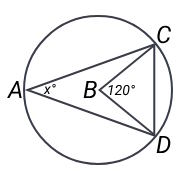
| Quantity A | Quantity B |
|---|---|
| The area of the triangle \(ACD\) | \(2\) times the area of triangle \(BCD\) |
A) Quantity A is greater
B) Quantity B is greater
C) The two quantities are equal
D) Relationship cannot be determined
The correct answer is: A)
Start by filling in angle x, which must be half 120.
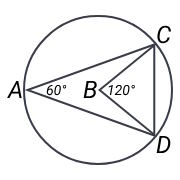
The other angles in the BCD triangle must both be 30 degrees for the sum of the three angles to be 180. If you notice, BCD becomes two 30-60-90 triangles when split in half.
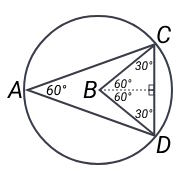
Now split the ACD triangle like so. The 60 degree angle at point A now becomes two angles of 30 degrees each.
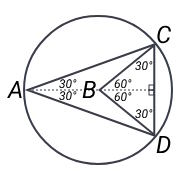
If you draw two other lines in the center of AC and AD that are perpendicular to those lines, they both meet at B. Now it should be clear that the entire triangle ACD is made up of six equally sized 30-60-90 triangles.
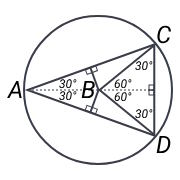
Quantity A is the sum of the area of these six equally sized triangles. Quantity B is the sum of two of these triangles multiplied by 2. In other words, Quantity B is the sum of 4 of the 30-60-90 triangles. Therefore Quantity A is greater than Quantity B.
Question 3
Verbal Reasoning
The trolley problem thought experiment is an inquiry into discerning the lesser of two evils: is it better to allow multiple people to die, or to (1) actively end the life of just one person.
Select the missing phrase for (1).
A) surreptitiously
B) garrulously
C) actively
D) passively
E) unknowingly
The correct answer is: C)
The first scenario is to “allow multiple people” to pass away, the second scenario, which must be opposite, would involve actively preventing multiple people passing away.
Question 4
Verbal Reasoning
During the early eighteenth century, music composed by George Frideric Handel began to circulate in miscellaneous publications of songs and arias. His music appeared invarious forms. Some publications, such as four notable pocket collections published in the mid-17205, preserve the music largely unchanged, although within a new sonic context. Other publications completely transformed arias and even overtures into vocal works with new texts, creating layers of musical associations and meanings. Unauthorized appearances of Handel’s music in songbook miscellanies and single-sided prints show alternative ways in which consumers may have heard and experienced the composer outside of the opera house or a concert setting. Examining these alternative sources for Handel’s music allows for an enriched assessment of which works of the composer were critically and commercially appreciated during the early eighteenth century. Analysing appearances of Handel’s music in songbook anthologies also offers insight into how musical miscellanies became ubiquitous forms of the production and reception of his works in the early eighteenth century.
Source: www.cambridge.org
Which of the following is a false statement about the miscellaneous publications on Handel’s work?
A) Handel began writing music before the mid-1720s
B) The publications were perfect facsimiles of his original work
C) His work appeared in musical anthologies
D) Some of the publications were unauthorized
E) Musical miscellania were the prevalent way people experienced Handel’s music
The correct answer is: B)
Some of the publication are said to have “completely transformed” Handel’s work. This is in complete contrast to the statement that they are “perfect facsimiles.” Therefore, The publications were perfect facsimiles of his original work is correct because it is a false statement. All other choices are confirmed by information presented in the text.
GRE® Prep Packages
GRE LEARN + PRACTICE PACKAGE
$
199
/ 12-month access
- Conceptual Video Lessons
- Easy-to-Read Online Textbook
- Quantitative Practice Problems
- Verbal Practice Problems
- Customizable Quizzes
- Vocabulary Building
- Instant Essay Grading
- Performance Tracking Tools
Testimonials






